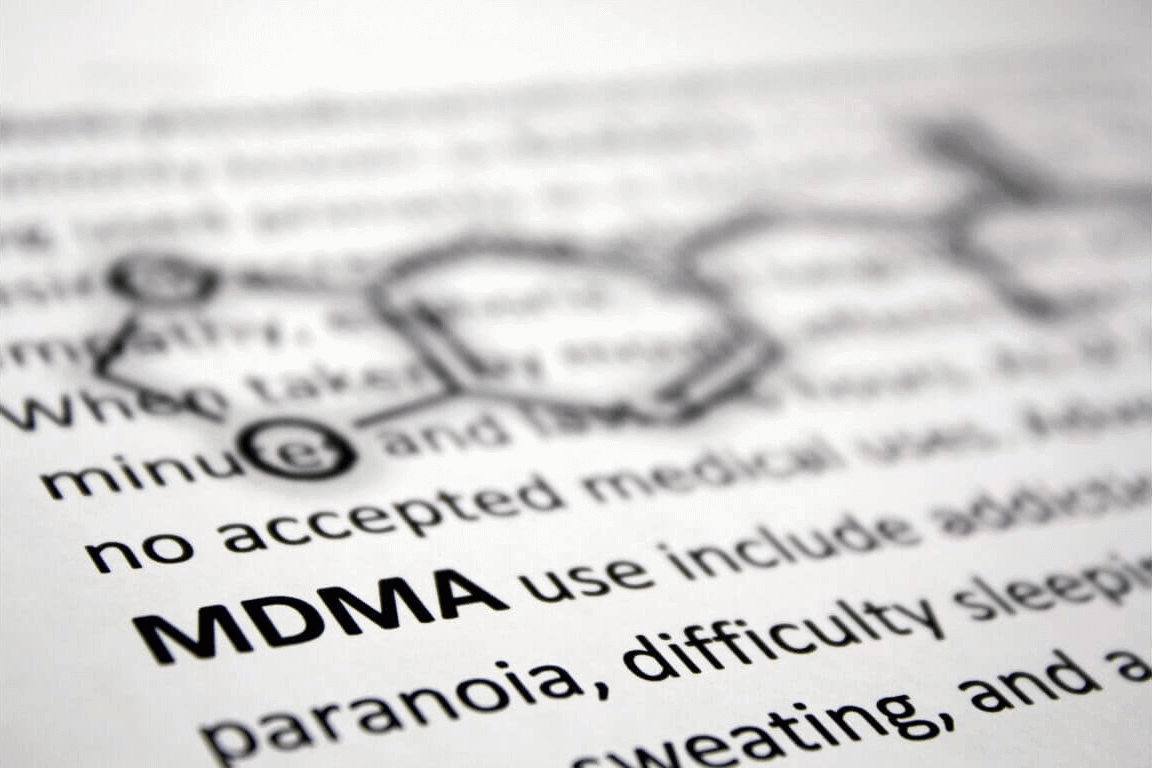
MDMA, commonly known as ecstasy or Molly, is a powerful synthetic drug that can have serious consequences when misused. While often associated with party culture, the effects of MDMA can lead to dependency, significant health risks, and lasting psychological challenges. At Keys Behavioral Health, we offer specialized treatment programs designed to help individuals overcome their addiction to MDMA and regain control of their lives. Our approach combines compassion, evidence-based practices, and personalized care to support long-term recovery.
MDMA, or 3,4-methylenedioxymethamphetamine, is available in various forms and levels of purity. Ecstasy is typically found as pills or tablets, which are often mixed with other substances such as caffeine, amphetamines, or even more dangerous drugs like fentanyl, increasing the risk of overdose.
Molly, usually sold as a crystalline powder, is marketed as a purer version of MDMA, but it’s often adulterated with synthetic cathinones (bath salts) or other harmful additives. Less commonly, MDMA is consumed in capsule or liquid form. On the streets, it’s known by names like X, XTC, E, Adam, Love Drug, and Rolls. The unpredictable nature of its ingredients and potency makes MDMA particularly dangerous, as users may unknowingly ingest toxic substances that can lead to serious health complications.

Though often seen as a “party drug” with euphoric and social effects, MDMA can cause severe long-term consequences. Addiction to MDMA affects not just the body, but also mental health and personal relationships. Many people underestimate its danger, believing it to be relatively harmless. However, prolonged or heavy use can lead to serious physical damage, emotional instability, and a decline in overall well-being.
MDMA addiction poses significant physical risks. In the short term, the drug raises body temperature dramatically, which can result in hyperthermia, dehydration, and electrolyte imbalance—especially in high-energy environments like clubs or festivals. Combined with extended periods of dancing and lack of hydration, this can quickly lead to heatstroke, organ failure, and even death. The drug also increases heart rate and blood pressure, which heightens the risk of cardiac complications, particularly for individuals with preexisting conditions.
With long-term use, MDMA can cause permanent neurological damage. It depletes serotonin levels in the brain—crucial for mood regulation—which can lead to chronic depression, insomnia, and anxiety. Frequent users often develop a tolerance, requiring higher doses to achieve the same high, increasing the risk of overdose, seizures, or serotonin syndrome—a potentially fatal condition involving muscle rigidity, confusion, and erratic heartbeat. Long-term exposure also compromises the immune system, leaving users vulnerable to infections and disease.
MDMA’s impact on the brain’s serotonin system significantly affects a person’s mental and emotional health. Over time, regular use can lead to severe mood disturbances, including emotional numbness, depression, and anxiety. As serotonin stores are depleted, users often struggle to experience joy or motivation, especially after the effects wear off. This crash is so common it’s earned the nickname “Suicide Tuesdays,” referring to the deep emotional lows that follow weekend use.
Cognitively, MDMA abuse is linked to impaired memory, reduced focus, and difficulty with decision-making. These issues often interfere with daily responsibilities and personal relationships. Chronic use can also lead to increased impulsivity and poor judgment, causing individuals to engage in risky behaviors like unprotected sex or dangerous driving. These psychological symptoms don’t always disappear after quitting the drug and may persist for months or years, making recovery especially difficult for long-term users.
Addiction to MDMA can devastate personal relationships and social stability. As use becomes more frequent, individuals may begin to withdraw from family and friends, choosing instead to associate with other users. This isolation, combined with the mood swings and unpredictable behavior caused by the drug, can create tension and conflict in close relationships. Many people addicted to MDMA experience declines in work or academic performance, neglect responsibilities, and lose interest in activities they once enjoyed.
Financial struggles often follow, as the cost of maintaining a drug habit rises. In some cases, individuals may borrow money, steal, or engage in illegal activities to support their addiction. The social environments often associated with MDMA—such as raves, parties, and club scenes—can expose users to violence, unsafe sex, or legal trouble. Getting caught in possession of MDMA can lead to criminal charges, fines, and incarceration, all of which can damage a person’s future in terms of employment, education, and personal reputation. Over time, MDMA addiction can result in a shrinking social circle, leaving users feeling isolated and disconnected, which makes the road to recovery even more difficult.
Recognizing the signs of MDMA addiction can be challenging, especially because the drug is often used recreationally in social settings and may not be immediately associated with dependency. One of the earliest indicators is frequent or increased use—individuals may begin taking MDMA more often or in higher doses to achieve the same euphoric effects. They might start planning their activities around when they can use the drug or feel compelled to use it in situations where they previously wouldn’t. A noticeable preoccupation with obtaining or using MDMA, especially at the expense of work, school, or relationships, is a strong warning sign of addiction.
Behavioral changes are also common and may include erratic sleep patterns, loss of appetite, and frequent periods of extreme energy followed by emotional crashes. People addicted to MDMA often experience mood swings, ranging from euphoria and heightened sociability while on the drug to irritability, depression, or anxiety afterward. These emotional fluctuations can strain relationships and lead to social withdrawal. Users may also become secretive about their drug use, avoid responsibilities, and neglect their appearance or hygiene as the addiction deepens.
Cognitive and emotional impairments become more pronounced with long-term use. Individuals may struggle with memory lapses, poor concentration, and difficulty making decisions. They might also exhibit signs of emotional detachment, paranoia, or impulsive behavior. Over time, these issues can affect job performance, academic achievement, and daily functioning. Despite experiencing negative consequences, people addicted to MDMA often continue using it compulsively, finding it difficult to stop without professional support due to the strong psychological dependence and the emotional lows that follow the drug’s effects.

Successfully treating MDMA addiction requires an all-encompassing strategy that tackles both the mental and emotional challenges tied to long-term use. Although MDMA may not cause severe physical dependency like opioids or alcohol, its impact on the brain—particularly the serotonin system—can make withdrawal and recovery mentally draining. The best outcomes typically come from a comprehensive approach that includes detox, counseling, lifestyle adjustments, and ongoing support to promote long-term healing.
The initial stage of recovery is detoxification, allowing the body to rid itself of MDMA. While physical withdrawal is generally milder compared to other substances, many users face emotional instability, fatigue, depression, and cravings that can be hard to manage alone. At Keys Behavioral Health, we offer detox placement services.
Medical Monitoring: Though not usually life-threatening, detox should be overseen by professionals—especially if the person experiences severe depression or suicidal thoughts.
Rehydration and Nutrition: Replenishing fluids and nutrients lost during drug use helps restore the body’s balance.
Rest and Sleep: Regaining healthy sleep patterns is critical since many experience insomnia and exhaustion.
Avoiding Triggers: Steering clear of high-risk environments—like clubs, raves, or social groups associated with MDMA use—can reduce relapse risks.
Because MDMA addiction primarily affects mood and behavior, therapy is a vital part of the recovery process. A mix of evidence-based therapies is used to treat psychological dependence, encourage personal growth, and reduce the risk of relapse.
Cognitive-Behavioral Therapy (CBT): Teaches individuals how to identify and correct destructive thought patterns and behaviors.
Contingency Management (CM): Uses positive reinforcement to encourage drug-free living.
Motivational Interviewing (MI): Helps build confidence and internal motivation for staying sober.
Family and Group Therapy: Reconnects individuals with supportive networks while healing strained relationships.
Individual Therapy: Offers a safe space to explore personal trauma, emotional pain, or underlying issues fueling drug use.
While there are no medications approved specifically for treating MDMA addiction, medical professionals often use supportive medications to treat related symptoms or underlying mental health conditions.
Antidepressants (SSRIs/SNRIs): Help balance serotonin levels affected by MDMA use, easing symptoms of depression.
Anti-Anxiety Medications: May be prescribed short-term to reduce severe anxiety or panic attacks.
Sleep Aids: Non-habit-forming supplements like melatonin can assist in re-establishing a healthy sleep schedule.
True recovery from MDMA addiction involves more than quitting the drug—it’s about cultivating a life that supports emotional health and personal fulfillment. Long-term success comes from continued effort, structured support, and a dedication to self-care.
Ongoing connection with others who understand the recovery journey can make a powerful difference.
Narcotics Anonymous (NA): A spiritual 12-step program offering peer support, structure, and guidance.
SMART Recovery and LifeRing: Non-religious programs that use cognitive and behavioral tools to support sober living.
Peer Support: Being part of a community of individuals with shared experiences reduces isolation and provides strength through accountability.
Sustained recovery depends on developing a lifestyle that supports mental clarity, physical health, and emotional stability.
Routine and Structure: Establishing regular routines promotes discipline and stability.
Exercise and Balanced Diet: Physical activity boosts mood naturally, and good nutrition helps repair the body and brain.
Stress Management: Practicing mindfulness, yoga, journaling, or creative hobbies can reduce the temptation to return to drug use.
Trigger Avoidance: Learning to identify and stay away from people, places, and situations that encourage drug use is crucial for long-term sobriety.
Recovering from MDMA addiction is a journey that takes commitment, support, and a willingness to change. Though the path can be difficult, the right combination of therapy, medical support, healthy habits, and peer connection can empower individuals to overcome their addiction and rebuild a life filled with purpose and clarity. If you or someone you know is struggling, don’t wait—professional help is the first step toward lasting recovery and a brighter future.

Here are just a handful of things you can expect to receive from our team:
If you or someone you love is struggling with addiction, don’t wait to get help. Contact us today for addiction treatment in Tewksbury, MA.